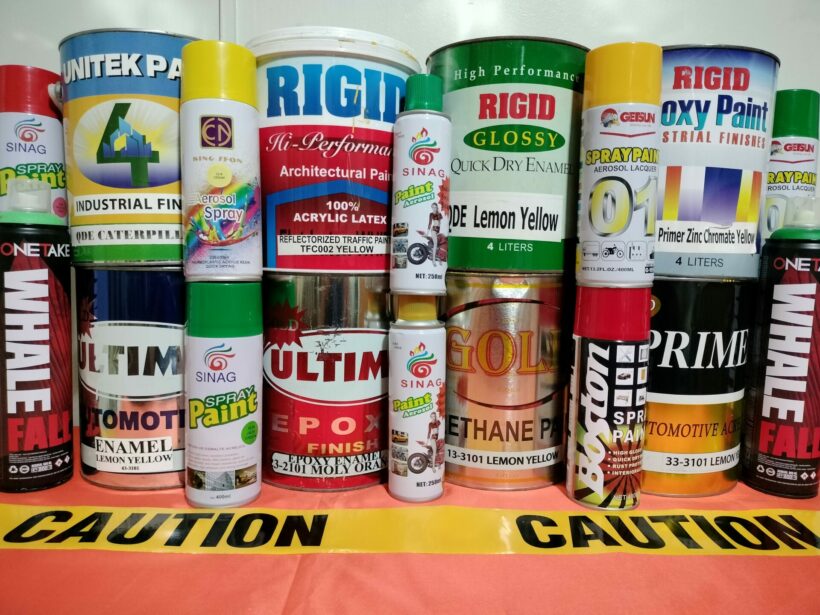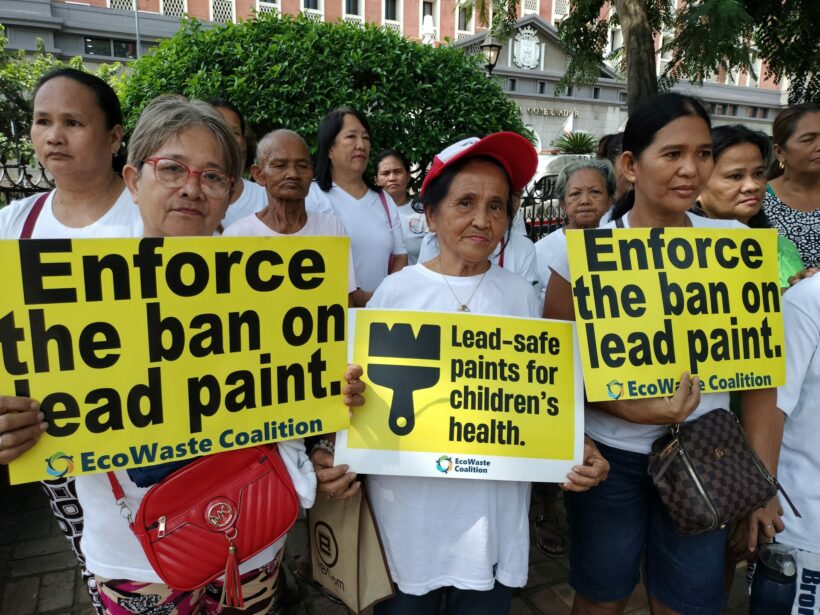EcoWaste Coalition and IPEN Push for Improved Compliance Monitoring and Other Measures to Advance Lead Paint Ban
21 October 2023. Despite the notable progress in banning lead in paint manufacturing, a new study found lead in some solvent-based decorative and industrial paints on sale in the Philippines. The study jointly carried out by the EcoWaste Coalition and the International Pollutants Elimination Network (IPEN) highlights the importance of improved compliance monitoring and other regulatory measures to completely rid the marketplace of such dangerous products. The study was released in time for the 11th International Lead Poisoning Prevention Week (October 22-28) with the theme “End Childhood Lead Poisoning.”
The manufacture, importation, and sale of paint with lead levels above 90 parts per million (ppm) is prohibited under the Chemical Control Order (CCO) promulgated by the Department of Environment and Natural Resources (DENR) in 2013. Following a transition period, lead-containing decorative and industrial paints were phased out in December 2016 and December 2019, respectively. With the Philippine Paint and Coatings Association (PPCA, formerly known as the Philippine Association of Paint Manufacturers) at the helm, affiliated companies successfully completed the switch to non-lead paint production.
“Despite the successful switch to non-lead substitutes by PPCA and most non-PPCA member companies, we continue to find lead-containing paints on store shelves and in online shopping platforms,” noted Manny Calonzo, Campaigner, EcoWaste Coalition. “While the number of local companies still selling such paints has dropped to three, the importation and sale of leaded spray paints often without manufacturers’ markings continued unabated,” he said. “The study results provide a strong justification to strengthen compliance monitoring and enforcement mechanisms to ensure adherence to the national lead paint ban.”
“Lead paint today remains a major source of childhood lead exposure and no known threshold levels of lead are considered safe,” said Jeiel Guarino, Global Lead Paint Elimination Campaigner, IPEN. “Safer and cost-effective alternatives to lead are now widely available for all paints including industrial paints.”
Environmental health specialist Dr. Geminn Louis Apostol from the Ateneo School of Medicine and Public Health (ASMPH), said: “While lead is also harmful to adults, babies and kids are most susceptible to the adverse effects of lead exposure. Young children are particularly vulnerable to the toxic effects of lead with the developing brain and nervous system the critical target, causing lower intelligence quotient (IQ), attention deficit disorder, and behavioral problems. Children can be affected by ingesting dust or soil containing lead that gets into their hands, eating leaded paint chips, and biting or chewing on objects like toys and furniture containing lead.”
To protect children and other vulnerable groups like workers and women of reproductive age against the harmful effects of lead exposure, both the EcoWaste Coalition and IPEN have expressed support for regulatory measures that will deter infringement of the country’s lead paint ban, including enhanced monitoring, tightened customs checks, stiffer fines and penalties for non-compliance, and global control on trade in lead chromates and in paints containing them.

Analyzed paints with lead content exceeding the 90 parts per million (ppm) limit as per the DENR-issued Chemical Control Order.
From May to July 2023, the EcoWaste Coalition purchased a total of 46 cans of solvent-based paints representing 27 brands produced by 22 manufacturers from various retail stores and online dealers in the Philippines. These include 17 industrial paints, 14 spray paints, nine decorative paints, and six anti-corrosive paints. Samples from these paints were analyzed by an accredited laboratory in the USA for total lead content.
Key findings from the report include:
–20 out of 46 solvent-based paints (43 percent) contained lead concentrations above the 90 ppm limit. Moreover, 14 paints (30 percent) contained extremely high lead levels above 10,000 ppm.
— The highest lead concentration detected was 98,000 ppm in a yellow Gold Urethane Paint for automotive use manufactured by A-Jaycee Chemicals Trading Corp.
— 26 out of 46 solvent-based paints (57 percent) did not contain intentionally added lead indicating the capability of companies to produce paints without lead additives.
— Only 13 out of 46 paints provided information about lead on their labels. No precautionary warnings on the effects of lead dust to children and pregnant women were provided. Five lead-containing paints were falsely marked as “lead-free” or “no lead,” and one paint carried the Lead Safe Paint® logo, a registered trademark, without authorization from the certification body.
Key recommendations made in the report include:
Government: For the DENR to further strengthen mechanisms to monitor compliance to the CCO banning lead in the manufacture of paints, and for the agency to nominate lead chromates, the most common lead-based paint pigments, for listing under the Rotterdam Convention to control the entry of such raw materials and the finished paint products containing them.
Industry: For paint companies to obtain third-party Lead Safe Paint® Certification to assist consumers in making an informed choice when buying paints; for companies that still produce, import, distribute or sell lead-containing paints to halt such practices; and for companies to take back any remaining stocks of their old-lead containing paints from retail outlets to stop their sale and use. Also, for paint sellers to stock products bearing the Lead Safe Paint® logo and/or other verifiable proof of adherence to the lead paint standard.
Consumers: For consumers to insist on their legally protected rights to truthful product information and to product safety, and to seek adequately labeled and lead-safe paint products.
About the EcoWaste Coalition:
The EcoWaste Coalition is a non-profit network of over 100 public interest groups in the Philippines that have coalesced to advance “a zero waste and toxics-free society where communities enjoy a safe and healthy environment.” It is a member of the Global Alliance to Eliminate Lead Paint. For information, visit: http://ecowastecoalition.blogspot.com
About IPEN:
IPEN is a network of over 600 non-governmental organizations working in more than 120 countries to reduce and eliminate harm to human health and the environment from toxic chemicals. It has conducted studies of lead in paint in more than 50 countries and is a member of the Global Alliance to Eliminate Lead Paint Advisory Council. For information, visit: https://ipen.org/










